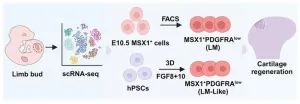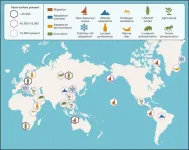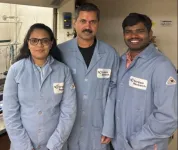(Press-News.org) Artificial Intelligence has helped scientists reveal a new form of aggressive prostate cancer which could revolutionise how the disease is diagnosed and treated in the future.
A Cancer Research UK-funded study published today, 29 February 2024, reveals that prostate cancer, which affects one in eight men in their lifetime, includes two different subtypes termed evotypes.
The discovery was made by an international team led by the University of Oxford, and the University of Manchester, who applied AI (artificial intelligence) on data from DNA to identify two different subtypes affecting the prostate.
The team hope their findings could save thousands of lives in future and revolutionise how prostate cancer is diagnosed and treated. Ultimately, it could provide tailored treatments to each individual patient according to a genetic test which will also be delivered using AI.
According to Cancer Research UK, prostate cancer is the most common cancer affecting men in the UK with around 52,000 cases a year. Dr Rupal Mistry, the charity’s senior Science Engagement Manager, said:
“The work published today by this global consortium of researchers has the potential to make a real difference to people affected by prostate cancer. The more we understand about cancer the better chance we have of developing treatments to beat it. We are proud to have helped fund this cutting-edge work, which has laid the foundations for personalised treatments for people with prostate cancer, allowing more people to beat their disease.”
The ground-breaking research, which involved additional funding from Prostate Cancer Research and involved scientists from the University of Oxford, the University of Manchester, the University of East Anglia and the Institute of Cancer Research, London, highlights how a prostate cancer diagnosis can affect physical, emotional and mental wellbeing.
Lead researcher Dr Dan Woodcock, of the Nuffield Department of Surgical Sciences at the University of Oxford, said: “Our research demonstrates that prostate tumours evolve along multiple pathways, leading to two distinct disease types.
“This understanding is pivotal as it allows us to classify tumours based on how the cancer evolves rather than solely on individual gene mutations or expression patterns.”
The researchers worked together as part of international consortium, called The Pan Prostate Cancer Group, set up by scientists at The Institute of Cancer Research (ICR) and The University of East Anglia to analyse genetic data from thousands of prostate cancer samples across nine countries.
Crucially, the team's collaboration with Cancer Research UK (CRUK) aims to develop a genetic test that, when combined with conventional staging and grading, can provide a more precise prognosis for each patient, allowing tailored treatment decisions.
The researchers used AI to study changes in the DNA of prostate cancer samples (using whole genome sequencing) from 159 patients.
They identified two distinct cancer groups among these patients using an AI technique called neural networks. These two groups were confirmed by using two other mathematical approaches applied to different aspects of the data. This finding was validated in other independent datasets from Canada and Australia.
They went on to integrate all the information to generate an evolutionary tree showing how the two subtypes of prostate cancer develop, ultimately converging into two distinct disease types termed ‘evotypes’.
Professor David Wedge of Manchester Cancer Research Centre, who led the study, explained: “This realisation is what enables us to distinguish the disease types. This hasn’t been done before because it’s more complicated than HER2+ in breast cancer, for instance.
"This understanding is pivotal as it allows us to classify tumours based on their evolutionary trajectory rather than solely on individual gene mutations or expression patterns."
Researcher Professor Colin Cooper, from UEA’s Norwich Medical School, highlighted that while prostate cancer is responsible for a large proportion of all male cancer deaths, it is more commonly a disease men die with rather than from. This means that unnecessary treatment can often be avoided, sparing men from side-effects such as incontinence and impotence.
He added: “This study is really important because until now, we thought that prostate cancer was just one type of disease. But it is only now, with advancements in artificial intelligence, that we have been able to show that there are actually two different subtypes at play.
“We hope that the findings will not only save lives through better diagnosis and tailored treatments in the future, but they may help researchers working in other cancer fields better understand other types of cancer too.”
Dr Naomi Elster, Director of Research at Prostate Cancer Research, said: “We simply don’t know enough about what a prostate cancer diagnosis means at present – there are many men who have disease which is or may become aggressive and being able to treat aggressive disease more effectively is critical. But on the other side of the coin are the too many men who live with side effects of cancer treatment they may never have needed.
“These results could be the beginning of us being able to take the same ‘divide and conquer’ approach to prostate cancer that has worked in other diseases, such as breast cancer.”
Professor Ros Eeles, Professor of Oncogenetics at The Institute of Cancer Research, London, and Honorary Consultant in Clinical Oncology and Cancer Genetics at The Royal Marsden NHS Foundation Trust, said: “This study has utilised the enormous genomic dataset from The Pan Prostate Cancer Group – a powerhouse of information about prostate cancer from around the world. These results will hopefully lead to better treatments for patients, demonstrating the importance of data sharing and team science.”
END
Artificial intelligence reveals prostate cancer is not just one disease
2024-02-29
ELSE PRESS RELEASES FROM THIS DATE:
New type of stem cells contains potential for knee cartilage regeneration in arthritic mice
2024-02-29
Osteoarthritis (OA) is a debilitating joint disease which affects over 500 million people worldwide, with trends increasing as populations age. OA is caused by progressive, irreversible degeneration of joint cartilage, leading to pain, swelling and immobility in the affected joint. Current therapies focus on symptom relief but cannot restore degenerated cartilage.
A potentially alternative treatment is the regeneration of cartilage from stem cells. Importantly, not all types of stem cells can make cartilage and earlier clinical trials with mesenchymal stem or stromal cells (MSCs) obtained did not convincingly show that MSCs make new cartilage when given to OA patients. In search for the ...
Becoming human: An ancient genome perspective
2024-02-29
Writing a commentary in the 50th anniversary issue of Cell, FU Qiaomei and E. Andrew Bennett, both of the Institute of Vertebrate Paleontology and Paleoanthropology (IVPP) of the Chinese Academy of Sciences, explored the contribution of paleogenomics to our understanding of the evolution of modern humans.
Given her numerous contributions to the field of human evolution through the analysis of both archaic and early modern human genomes, Prof. FU was invited by the journal Cell to write a commentary reviewing what we have learned about the evolution ...
Extreme weather events tied to increased mortality and emergency department activity
2024-02-29
Climate change is increasing the frequency and intensity of severe weather events, which may particularly endanger vulnerable populations such as the elderly. Researchers from Mass General Brigham and colleagues examined how weather disasters between 2011 and 2016 influenced healthcare delivery and mortality among Medicare beneficiaries in affected counties, finding that one week after major weather events, emergency department (ED) use and mortality remained elevated by 1.22% and 1.4%, respectively, from pre-disaster ...
Bottlenecks and beehives: how an invasive bee colony defied genetic expectations
2024-02-29
For more than a decade, invasive Asian honeybees have defied evolutionary expectations and established a thriving population in North Queensland, much to the annoyance of the honey industry and biosecurity officials.
Research published today in Current Biology has shown the species, Apis cerana, has overcome what is known as a genetic bottleneck to grow from a single swarm into a population of more than 10,000 colonies over a 10,000 square kilometre area – which is about the size of Greater Sydney.
Co-lead author Dr Rosalyn Gloag from the University of Sydney School of Life and Environmental Sciences said: “Our study of this bee population shows that some species can ...
Climate: 2023 – 24 El Niño likely to cause record-breaking average temperatures in some areas
2024-02-29
Several areas of the globe — including the Bay of Bengal, the Philippines, and the Caribbean Sea — are likely to experience record-breaking average surface air temperatures in the year period up to June 2024 as a result of the ongoing El Niño phenomenon. The modelling results, published in Scientific Reports, also suggest that there is an estimated 90 percent chance of record-breaking global mean surface temperatures occurring over the same period under a moderate or strong El Niño scenario.
The El Niño-Southern Oscillation, centred ...
Disparities in patient portal use among adults with chronic conditions
2024-02-29
About The Study: This study of 536 participants identified changes in patient portal use over time and highlighted populations that had lower access to health information. The COVID-19 pandemic was associated with an increase in portal use. Sociodemographic disparities by sex and age were reduced, although disparities by health literacy widened. A brief validated health literacy measure may serve as a useful digital literacy screening tool to identify patients who need further support.
Authors: Esther Yoon, Ph.D., M.P.H., M.S., of Northwestern University in Chicago, is the corresponding ...
Factors associated with racial and ethnic disparities in locally advanced rectal cancer outcomes
2024-02-29
About The Study: The findings of this study of 34,500 patients suggest that racial and ethnic disparities in locally advanced rectal cancer treatment outcomes may be multifactorial, with an independent association with non-Hispanic Black race, suggesting unidentified biological variables or social determinants of health that warrant exploration.
Authors: Sanjeevani Arora, Ph.D., and Shannon M. Lynch, Ph.D., M.P.H., of the Fox Chase Cancer Center in Philadelphia, are the corresponding authors.
To access the embargoed study: Visit our For The Media website at this link https://media.jamanetwork.com/
(doi:10.1001/jamanetworkopen.2024.0044)
Editor’s ...
CZI announces multi-institutional collaborations for tech to better understand cells
2024-02-29
Today, the Chan Zuckerberg Initiative (CZI) announced four multi-year grants that will bring together regional labs in California, the Mid-Atlantic, and the Research Triangle in North Carolina to explore the frontiers of genomics, cell biology, and synthetic biology by developing new measurement technologies. These projects will focus on developing technologies to engineer cell and tissue models, exploring cellular responses to genetic and environmental stressors, understanding RNA's role in metabolism, and more.
“To unravel the mysteries of the cell, we need new technologies, and the Exploratory Cell Networks grants support early-stage ...
Researchers uncover key therapeutic target involved in diabetic atherosclerosis
2024-02-29
Diabetes accelerates the development of atherosclerosis, increasing the incidence of cardiovascular events. In atherosclerosis, immune cells called macrophages release molecules such as chemokines and cytokines, causing inflammation and leading to arterial plaque formation. However, significant gaps persist in understanding the exact molecular mechanisms controlling this increased inflammatory response in individuals with diabetes. In a new, preclinical study, researchers from Brigham and Women’s Hospital, a founding member of the Mass General Brigham healthcare system, identified a long non-coding RNA (lncRNA) sequence that could help them unravel the ...
Scripps Research scientists reveal how first cells could have formed on Earth
2024-02-29
LA JOLLA, CA—Roughly 4 billion years ago, Earth was developing conditions suitable for life. Origin-of-life scientists often wonder if the type of chemistry found on the early Earth was similar to what life requires today. They know that spherical collections of fats, called protocells, were the precursor to cells during this emergence of life. But how did simple protocells first arise and diversify to eventually lead to life on Earth?
Now, Scripps Research scientists have discovered one plausible pathway for how protocells may have first formed and chemically ...



